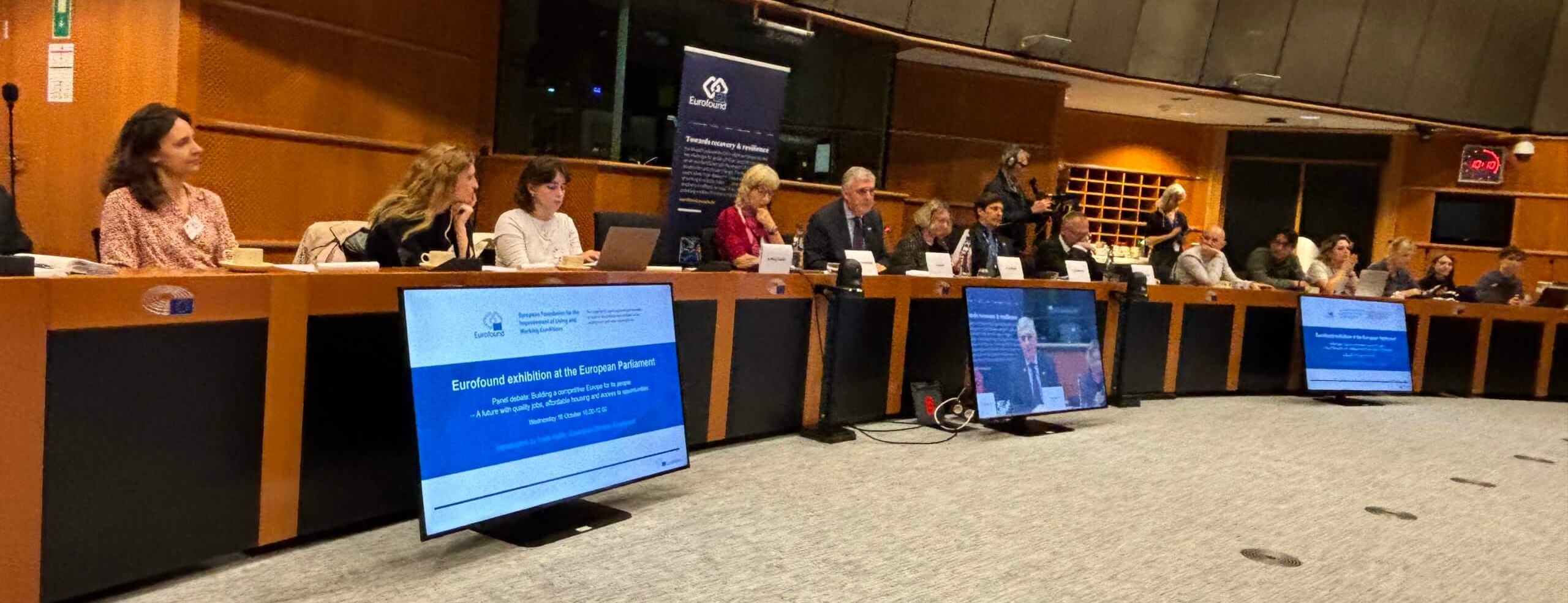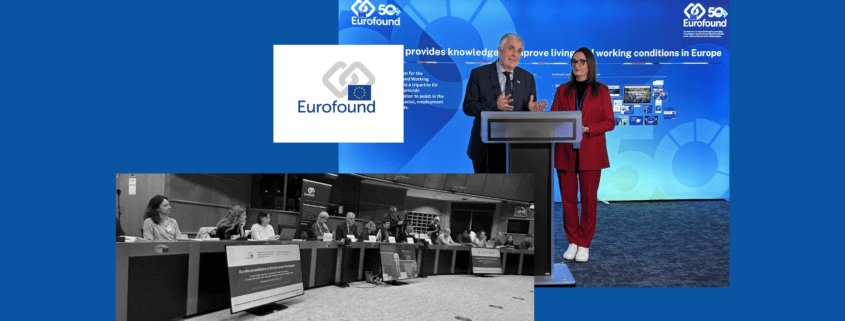CEC European Managers joins Eurofound panels at the European Parliament
CEC European Managers participated in the inauguration ceremony of Eurofound’s exhibition and panels at the European Parliament in Brussels. This event offered a platform for data-driven discussions on pressing social and employment issues in the EU, including remote work, AI in the workplace, job quality, and housing challenges.
Eurofound is the European Foundation for the Improvement of Living and Working Conditions, a tripartite EU agency that provides knowledge to assist in the development of better social, employment, and work-related policies.
Established in 1975 and based in Dublin, Eurofound focuses on job quality, social dialogue, and working conditions. However, it has expanded its research to cover contemporary challenges, such as the impact of AI and the right to disconnect.
Eurofound serves as a bridge between employers, unions, and governments to foster better working conditions in Europe. Its experts, such as A. Ludwinek, B. Gerstenberger, T. Leončikas, and M. Mascherini, presented vital research insights, underscoring Eurofound’s role in shaping EU policies for better working and living conditions, as well as an exhibition that aligns with Eurofound’s commitment to evidence-based policy support in its 50th-anniversary year.

Key insights from the conversations between MEPs and Eurofound experts
Between 15-17 October, coinciding with Eurofound‘s exhibition at the European Parliament, several panels and sessions with social partners, MEPs, and stakeholders were organized.
In the morning of 16 October, a lively debate unfolded at the EP, featuring Members of the European Parliament (MEPs) alongside key experts from Eurofound who took this opportunity to highlight some of the relevant data gathered through their survey studies over the past years.
The discussion, which covered topics ranging from labour market challenges and working time reduction to gender pay gaps and housing, brought into focus both the progress and pressing issues faced by EU member states. Housing was one of the hot topics of this session.
Data utilization and policy-making
Anna Ludwinek , Liasion manager at Eurofound‘s office in Brussels, addressed the Parliament‘s limited use of the agency’s data. She stated, “The European Parliament has not been using us as much as they could, but we are providing data on how your country is performing and how it compares to others with much precision.”
Adding to the conversation, Barbara Gerstenberger, Head of the Working Life unit at Eurofound, highlighted a current initiative from the agency: “Our pilot project studies how the reduction of working time affects productivity. We are analyzing 50 case studies in our member states,” she said.
She noted a trend toward reducing workdays while maintaining the same total hours, a shift with significant implications for labour productivity and work-life balance.
The role of Eurofound in labour and Social Dialogue
Tadas Leončikas, Head of the Employment unit, emphasized the agency’s governance model and broad impact. Leončikas also presented a milestone:
Today, 200 million people in the EU have a job, the highest number in history.
Tadas Leončikas
Head of the Employment unit of Eurofound
Massimiliano Mascherini, Head of the Social Policies unit, addressed the agency’s influence on the Child Guarantee policy implementation, which seeks to tackle child poverty across Europe. “The implementation of the Child Guarantee shows the impact of Eurofound in policymaking,” he remarked.
However, he highlighted ongoing challenges, including unemployment disparities: “There are 12.1 million unemployed Europeans, and not everyone experiences unemployment the same way.”
Gender pay gap and pay transparency
Turning to gender issues, Gerstenberger underscored the persistence of the gender pay gap in the EU. “Only one-third of the gender pay gap can be explained by statistics,” she shared.
For example, in Germany, “60% of German women believe they are worse paid than their male colleagues,” she noted, emphasizing the need for policy interventions to address these disparities. “270 billion is the cost of the gender employment gap in the EU,” Massimiliano Mascherini added.
270 billion is the cost of the gender employment gap in the EU
Massimiliano Mascherini
Head of the Social Policies unit of Eurofound
In response, Evelyn Regner, an MEP for the Group of the Progressive Alliance of Socialists and Democrats, voiced the need for more robust measures on pay equity: “Equal pay for work of equal value is fundamental. Pay transparency should be mandatory, not voluntary,” she argued, drawing attention to the European Commission’s initiatives on fair wages and transparency to close gender-based pay gaps.
AI and job quality
As the debate shifted to the future of work, Ivailo Kalfin, Eurofound Executive Director, highlighted the organisation’s ongoing discussions with the European Commission on the role of Artificial Intelligence (AI) in workplaces. “
“We are debating with the EU Commission about a pilot project on the effects of AI in the workplace,” he explained. This research will aim to balance AI’s potential to enhance productivity with concerns about its impact on job quality and worker displacement.
Quality of life and housing crisis
The conversation then turned to housing, perhaps the most critical issue affecting the quality of life across the EU.
Aodhán Ó’Ríordáin, MEP for the Group of the Progressive Alliance of Socialists and Democrats, highlighted the challenges children face in disadvantaged areas: “It is not easy for them to do their homework or invite friends. Housing has a tremendous effect on socialization.”
He pointed to alarming statistics, noting, “400,000 children in the EU are homeless,” urging policymakers to address housing insecurity at both local and European levels.
400,000 children in the EU are homeless
Aodhán Ó’Ríordáin
MEP for the Group of the Progressive Alliance of Socialists and Democrats
Yana Toom, MEP for Renew Europe, further stressed the need for legislative action on housing. “Some issues we cannot solve at a European level; we need to tackle them locally or nationally,” she argued, adding, “If member states don’t deliver, people protest to EU institutions.”
Toom called for a coordinated effort to address housing affordability and quality across Europe, noting that unresolved housing issues often lead to public discontent with EU institutions.
Maria Ohisalo, MEP for the Greens, connected the housing crisis to energy challenges, pointing out, “Energy poverty is a big challenge linked to housing.”
She emphasized that energy policy and housing quality are intertwined, affecting the overall quality of life for millions across the continent.
In the last 20 years, rental prices in the EU have increased by 35%, while overall housing costs have surged by 75%. However, incomes have only risen by 17%, making housing increasingly unaffordable for many.
Rental prices in the EU have increased by 35%, while overall housing costs have surged by 75%
Up to 46% of private renters in the past year have considered moving due to the cost of living.
Housing affordability remains a major issue in urban areas, where housing is often too expensive for lower-income groups.
Access to essential services like transportation, healthcare, and the internet is limited in rural areas, contributing to disparities.
Young people face significant challenges in the housing market. They often cannot afford to live close to work or in metropolitan areas, and social housing is still inaccessible for many, exacerbating housing insecurity.
The European Commission wants to explore Cohesion Funds to tackle this issue, for which it has no competence. Still, Article 7 of the Cohesion Funds prohibits their use for housing development.
A call for enhanced collaboration
As the debate concluded, it was clear that collaboration between Eurofound, the European Parliament, and social partners was essential to effectively foster social dialogue.
Barbara Gerstenberger invited further engagement, saying, “What can you ask us about regarding working conditions and social dialogue?” Her call underscored the need for Eurofound’s expertise to be fully utilized in shaping policies that enhance labor market conditions and social welfare across the EU.
Tadas Leončikas closed with an optimistic note on the EU’s achievements: “When we look at the data, we can all agree that the EU and the single market have saved many jobs.” He highlighted the ongoing commitment to building a Europe prioritizing job quality, fair pay, and sustainable social development.
This panel debate, filled with insights and calls to action, emphasized the importance of Eurofound’s research in guiding European policies that respond to the evolving needs of the labor market and the broader challenges affecting the quality of life across the EU.
- You can consult all of Eurofound’s publications here [+]
- and listen to the podcast Eurfound talks here [+]





